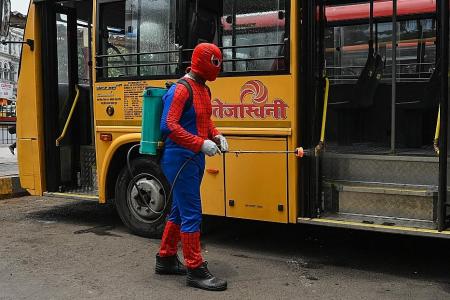Mumbai learnt from last year’s Covid crisis to beat the odds
MUMBAI: When Covid-19 arrived in India, few places looked as vulnerable as Mumbai. But a year on, South Asia's most crowded city has surprised many by tackling a vicious second wave with considerable success.
Mr Gaurav Awasthi travelled hundreds of kilometres from his home on the outskirts of Delhi to get his ailing wife a hospital bed there, paying an ambulance more than a thousand dollars to drive 24 hours straight.
"I cannot ever repay my debt to this city," the 29-year-old told AFP, recounting an ordeal that saw him spend five days fruitlessly searching for a bed across cities, including Delhi.
The bodies began turning up early in India's financial capital during the first wave of infections last year.
By May last year, anaesthesiologist Abhignya Patra was working 18-hour days at the massive Lokmanya Tilak Municipal General Hospital, better known as Sion.
Every night, the city helpline fielded thousands of calls from desperate citizens, many with no chance of getting admitted to a publicly funded hospital: Mumbai had just 80 ambulances and 425 intensive care units for a population of 20 million.
Something had to change fast, said Mr Iqbal Chahal, a no-nonsense bureaucrat who took over as Mumbai's municipal commissioner in May last year.
MORE HOSPITAL BEDS
New field hospitals added thousands of beds, private facilities handed over their Covid-19 wards to the government and 800 vehicles were turned into ambulances.
But these efforts could not combat the swift rise in infections.
A proactive approach focused on 55 slums including India's largest, Dharavi, where a strict lockdown was accompanied by aggressive sanitisation of public toilets, mass screening and a huge volunteer effort to ensure that nobody went hungry.
As 2020 wore on, it looked like India might have miraculously beaten the pandemic and lockdown restrictions were eased.
But in Mumbai, the authorities did not dismantle a single bed in the now-deserted field hospitals.
This meant that when cases surged in March, the metropolis was much better prepared than many other Indian cities, where the healthcare system came close to collapse.
Despite having a much higher population density than many other cities, Mumbai has seen significantly lower mortality rates.
The city still suffered close calls, Mr Chahal said, recalling one night in April when six hospitals faced dire oxygen shortages, putting 168 patients at serious risk unless they were shifted to other facilities.
Everyone survived.
"We always expected a second wave," Mr Chahal said. - AFP
Get The New Paper on your phone with the free TNP app. Download from the Apple App Store or Google Play Store now



